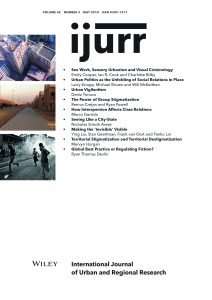In global urban studies, different cities often serve as stand‐ins for various policy approaches. New York is closely associated with zero tolerance/quality of life policing —specifically the ways this crime‐fighting technique was used to manage and regulate public space in support of broader urban redevelopment goals. Whether celebrated or criticized, the image of New York as a city that was successful in ‘cleaning up’ public space has been exported across the globe, and has been invoked by a number of cities as they embark on their own projects to clear street vendors and other unwanted actors from public space. This article will challenge this established narrative through an examination of struggles over street vending and public space in New York during the 1980s and 1990s. It will show how the revanchist project of public space management was challenged and ultimately limited by vendors using discourses of free market populism and entrepreneurship. It demonstrates the ways in which the image of New York as a city of settled and well‐regulated public space does not tell the complete story, and how New York, like many other ordinary cities across the globe, is a city of contested spaces and uncertain regulatory effectiveness.

